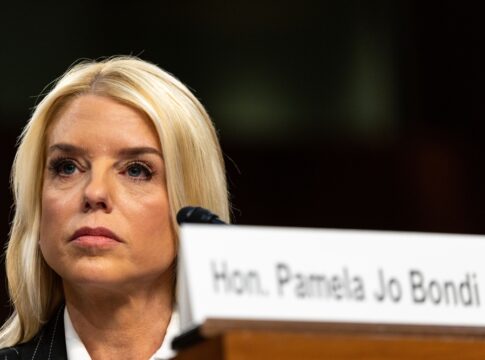When Democrats feel they have been offended…it’s a good day. Ten Senate Judiciary Committee Democrats chastised AG Bondi for easing rules on issuing subpoenas to journalists. Bondi reversed Biden-era regulations that restricted the DOJ’s ability to subpoena journalists except in cases of imminent harm. Bondi claims that the change addresses strategic leaks by Biden officials to favored journalists.
Democrats Challenge Bondi’s Subpoena Policy Changes
Ten Democratic members of the Senate Judiciary Committee have launched a formal challenge against Attorney General Pam Bondi’s recent decision to ease federal rules governing journalist subpoenas. In a May 7 letter, the senators expressed concern that Bondi’s policy revisions could undermine press freedoms guaranteed by the First Amendment. The policy change specifically rescinds Biden-era regulations that significantly limited the Department of Justice’s ability to compel information from journalists, allowing such measures only in cases involving imminent harm or death and only as a last resort.
The Democrats argue that the new rules will make it easier for the government to compel journalists to reveal their sources, potentially stifling critical reporting and deterring whistleblowers from coming forward with important information. This concern lies at the heart of their criticism, as they view the policy shift as a potential threat to transparent government operations and accountability.
Bondi’s memorandum and the Democrats’ response are the latest salvos in an increasingly intense struggle between DOJ and journalists that began under then-President Barack Obama nearly two decades ago. https://t.co/sPPhehgwIs
— The Daily Signal (@DailySignal) May 20, 2025
Bondi Defends Policy Change as Necessary Correction
Attorney General Bondi has defended her decision by pointing to what she describes as systematic abuse of the previous administration’s media policies. In her memorandum explaining the changes, Bondi cited frequent and selective leaking of information by Biden officials to preferred journalists as a primary justification for revising the rules. According to Bondi, these leaks were deliberately calculated to advance particular narratives on significant matters of public debate, often distorting the truth in the process.
Bondi further accused the Biden administration of employing gag orders to suppress criticism, including against President Trump and other defendants. She noted that despite the change in administration, leaks of sensitive information, including classified materials, have continued since President Trump’s second inauguration, necessitating a stronger policy response to protect national security interests and ensure fair legal proceedings.
JOURNALIST PROTECTIONS RESCINDED! No Leaks Allowed!
Attorney General Pam Bondi rescinded Biden-era Justice Department policies that largely shielded journalists' records from federal investigators on Friday, signaling a more aggressive approach toward leak prosecutions under… pic.twitter.com/niV9CFhrFr
— TRUTH NOW ⭐️⭐️⭐️🗽 🎺 (@sxdoc) April 26, 2025
Historical Context Raises Questions About Democratic Criticism
The current dispute between Bondi and Senate Democrats is part of a longer-standing tension between the Department of Justice and journalists that dates back to previous administrations. Critics have pointed out that many of the senators now criticizing Bondi remained notably silent when similar or more aggressive measures were implemented during the Obama administration, which was widely criticized for its approach to press freedoms despite some transparency initiatives.
“The Biden administration also abused [former Attorney General Merrick] Garland’s overly broad procedural protections for media allies by engaging in selective leaks in support of failed lawfare campaigns. The leaks have not abated since President Trump’s second inauguration, including leaks of classified information”. Bondi
The Committee to Protect Journalists previously noted that while the Obama administration did take some steps toward transparency, such as publishing White House visitor logs online, it “discloses too little of the information most needed” for true accountability. This historical context has led some observers to question whether the current criticism of Bondi reflects genuine concern for press freedom or simply partisan opposition to the administration’s policies.
Implications for Press Freedom and Government Transparency
As the debate continues, attention will focus on the specific guidelines Bondi ultimately implements and their practical effects on journalistic practices. Media advocates worry that loosening restrictions on journalist subpoenas could create a chilling effect on investigative reporting, particularly on sensitive government matters. Meanwhile, supporters of the policy revision argue that addressing selective leaks and ensuring equal application of the law strengthens rather than weakens democratic institutions by preventing politically motivated information manipulation.
The outcome of this policy dispute will likely shape the relationship between the current administration and the press corps for years to come, with significant implications for government transparency, national security protocols, and the public’s right to information. Both sides claim to be defending fundamental democratic values, highlighting the complex balance between press freedom and responsible governance.
Sources:
- Senate Dems Critical of Bondi’s Easing of Journalist Subpoena Rules Were Mum on Obama, Biden Actions


